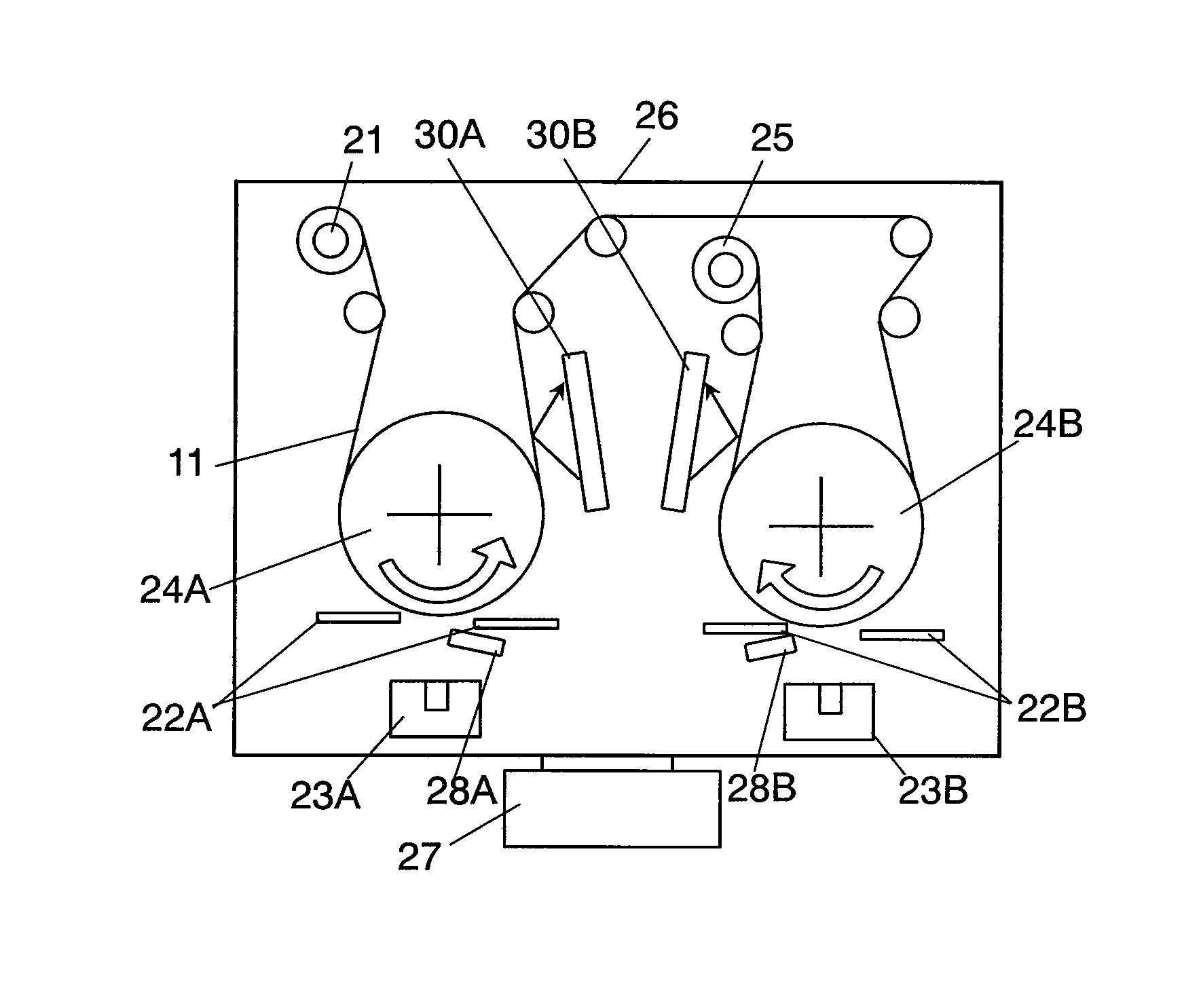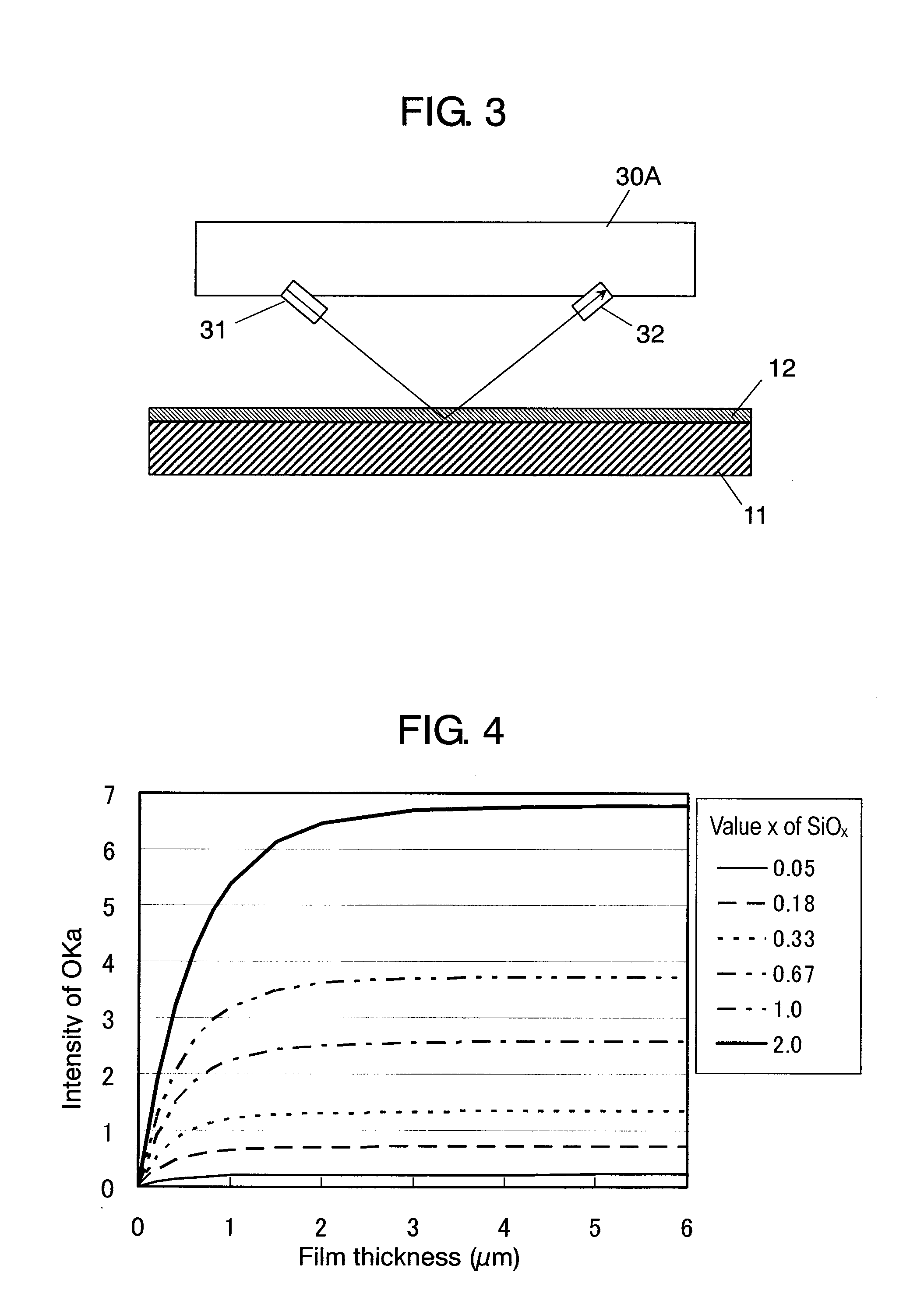Method for forming active material on a current collector of negative electrode using feedback process with measuring collector
a negative electrode and current collector technology, applied in the field of batteries, can solve the problems of deterioration of safety, unstable capacity of batteries, thermal instability of lithium, etc., and achieve the effect of stable manufacturing and less variation in properties
- Summary
- Abstract
- Description
- Claims
- Application Information
AI Technical Summary
Benefits of technology
Problems solved by technology
Method used
Image
Examples
first embodiment
[0029]FIG. 1 is a schematic view showing a configuration of an apparatus for manufacturing a negative electrode for a non-aqueous electrolyte secondary battery in accordance with a first embodiment of the present invention. FIG. 2 is a block diagram showing a detail of a principal part thereof. FIG. 3 is a view showing a configuration around a fluorescent X-ray analyzer that is a first measurement section in FIG. 1.
[0030]In the manufacturing apparatus shown in FIG. 1, current collector 11 is sent from winding-out roll 21 to winding-up roll 25 by way of deposition rolls 24A and 24B. These rolls and vapor deposition units 23A and 23B are provided in vacuum chamber 26. The pressure inside vacuum chamber 26 is reduced by using vacuum pump 27. Vapor deposition units 23A and 23B are units each including a vapor deposition source, a crucible and an electron beam generator. A procedure for forming active material layer 12 as an active material layer of a negative electrode at one side on cu...
second embodiment
[0056]FIG. 8 is a partially perspective view showing an apparatus for manufacturing a negative electrode for a non-aqueous electrolyte secondary battery in accordance with a second embodiment of the present invention and shows around deposition roll 24A. FIG. 9 is a block diagram showing a detail of a principal part thereof. In this embodiment, a configuration of a formation section including deposition roll 24A, winding-out roll 21, nozzle 28A, vapor deposition unit 23A, and the like, is the same as that in FIG. 1. In this embodiment, as the first measurement section, instead of XRF 30A, Fourier transform infrared spectroscopic analyzer (FTIR) 43 is provided. Furthermore, measuring winding-out roll 42 for supplying measuring current collector 41 is provided. Measuring winding-out roll 42 rotates faster than winding-out roll 21. That is to say, measuring current collector 41 is sent faster than current collector 11. A formation section deposits SiOx on current collector 11 and measu...
third embodiment
[0068]FIG. 12 is a partial plan view showing an apparatus for manufacturing a negative electrode for a non-aqueous electrolyte secondary battery in accordance with a third embodiment of the present invention and shows around deposition roll 24A. FIG. 13 is a block diagram showing a detail of a principal part thereof. In this embodiment, a configuration of a formation section including deposition roll 24A, winding-out roll 21, nozzle 28A and vapor deposition unit 23A, and the like, is the same as that in FIG. 1. In this embodiment, instead of XRF 30A, a first measurement section for measuring the thickness of active material layer 12, which includes base roll 52, thickness measurement device 51 and operation section 56, and a second measurement section for measuring the resistance of active material layer 12, which includes a pair of resistance measurement rolls 53 and resistance measurement device 57 are provided.
[0069]When current collector 11 passes on base roll 52, thickness meas...
PUM
| Property | Measurement | Unit |
|---|---|---|
| pressure | aaaaa | aaaaa |
| thickness | aaaaa | aaaaa |
| density | aaaaa | aaaaa |
Abstract
Description
Claims
Application Information
 Login to View More
Login to View More - R&D
- Intellectual Property
- Life Sciences
- Materials
- Tech Scout
- Unparalleled Data Quality
- Higher Quality Content
- 60% Fewer Hallucinations
Browse by: Latest US Patents, China's latest patents, Technical Efficacy Thesaurus, Application Domain, Technology Topic, Popular Technical Reports.
© 2025 PatSnap. All rights reserved.Legal|Privacy policy|Modern Slavery Act Transparency Statement|Sitemap|About US| Contact US: help@patsnap.com



